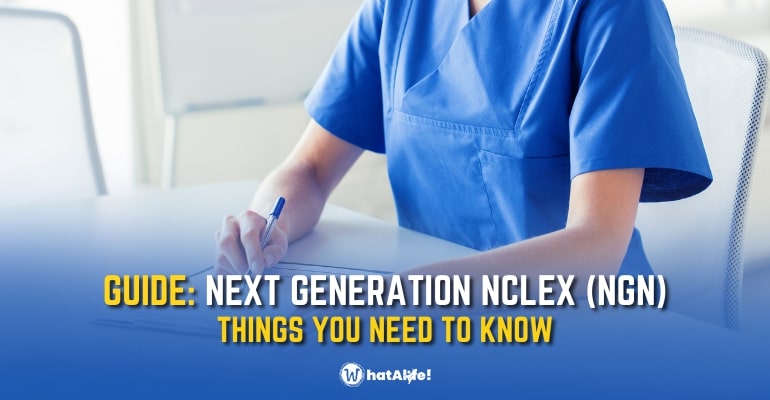To become a fully accredited nurse, you must pass the National Council Licensure Examination (NCLEX). The exam guarantees that nurses are ready for real-life practice and to provide public safety by doing so. However, the National Council of State Boards of Nursing (NCSBN) will change the NCLEX exams on April 1, 2023, and here are the things to keep in mind before taking Next Generation NCLEX or NGN.
Table of contents
The National Council Licensure Examination (NCLEX)
The National Council Licensure Examination (NCLEX) is a licensing exam for nurses in the United States, Australia, and Canada.
The examination is divided into two types, one for Registered Nurses, NCLEX-RN, and another for Practical Nurses, NCLEX-PN. The exam is periodically assessed every three years, making sure that the medical practices of future nurses will be up-to-date.
The recent assessment results have concluded that a significant revision is needed.
What’s The Change, And Why Change It?
Even without the global pandemic that has recently greatly affected the medical field, the change in exam content is inevitable. The National Council of State Boards of Nursing (NCSBN) conducted research last 2017 and concluded that nurses regularly provide care for seriously ill patients and manage complex decisions.
The new test questions of the Next Generation NCLEX (NGN) are intended to reflect the working environment of a hospital more accurately and lay the foundation for better patient outcomes. Thus, evaluating a nursing student’s judgment, decision-making, and critical thinking abilities is the main objective of the change.
To achieve these objectives, NCSBN shall revise the conventional tests focusing on clinical knowledge to ensure clinical skills are nurtured so the prospects of saving a patient will increase.
Specific Changes To The Exam
As stated earlier, the exam will focus on checking if the nurse can properly assess a patient’s needs. The task of a nurse is to form a hypothesis and assess the possible outcomes of their methods. Thus, choosing the proper course of action requires solid clinical skills.
Many factors can affect the outcome of the hypothesis, such as the patient’s culture, environment, and individual characteristics. Therefore, the exam gauges a nurse’s ability to identify relevant information from various sources.
The process below is the conceptual change that’s planned to be implemented in the Next Generation NCLEX (NGN):
- The test questions will provide information, and it is up to the examinee to choose what’s relevant and irrelevant.
- The test-taker is then directed by the questions to clinical presentations prioritizing information.
- They must also determine other things needed to establish a hypothesis.
- The questions then lead the nurse through prioritizing hypotheses according to urgency, and they must generate solutions that would result in a desirable outcome.
- Finally, the candidate indicates the appropriate action and evaluates the outcomes. The test also asks to consider what other interventions may have been more effective.
NCSBN has been adamant about these changes after a pilot study last 2016 where they discovered that clinical knowledge is essential but not enough to support clinical judgment.
The study also showed that clinical judgment gradually develops over time. There was no single element that predicted ability. Instead, the combination of various factors led to better decision-making.
Another factor that pushed this change was when a 2016 John Hopkins study suggested one-third of the leading causes of death in the U.S. is medical errors. Around 250,000 deaths were attributed to medical mistakes, which is higher than the deaths caused by respiratory diseases.
New Question Type
The NCSBN has authorized five new types of questions to assess nursing clinical judgment on the NGN based on the findings from the Special Research Section. Meanwhile, some of the present NCLEX-style questions are anticipated to remain on the exam, which will continue to be computer adaptive.
The five new question types of the Next Generation NCLEX (NGN) consist of the following:
Extended Multiple Response
- In the real world, you’re not limited to choosing a single option when challenged to select a choice. Therefore, this question type will add a “select all that apply” option or “Options 1 and 3 are applicable.”
Extended drag-and-drop
- Drag-and-drop questions let examinees move answers from selections into answer spaces. However, not all available options may be used to respond to the question in the new format, requiring a better comprehension of the subject to make an informed clinical decision.
Drop-down
- The test-taker can select one answer from a Drop-down list for this type of question. However, there may be more than one drop-down list this time. Afterward, a case study is given to the candidate, who is asked for up to six responses.
Matrix
- The items inside the matrix measure something or address an issue. Students are given a scenario and a list of data to make judgments and mark the correct boxes in the matrix. For example, the clinical data are displayed on the left side of the screen, and a grid of potential clinical tests appears on the other side. The examinee would decide which items are necessary, unnecessary, and hazardous.
Enhance Hotspot
- A part of the client chart is given for the examinees to read, then they choose words from the chart that addresses the question. For instance, clinical information is given to the learner. Afterward, they must click particular words or phrases in the report to respond to the question.
What Should Be My Preparations For The Exam?
To pass the Next Generation NCLEX (NGN), you should train your brain to familiarize patterns. Solving puzzles is an excellent way to achieve this. Moreover, get as much real-life practice to obtain experience and knowledge that you can use as a reference to various situations. Of course, with the exams coming soon, it’s best to start your preparations NOW. –WhatALife!/Vaughn
Source: (1)
Also read: Nurse Salary Grade in the Philippines 2022



Leave a Reply